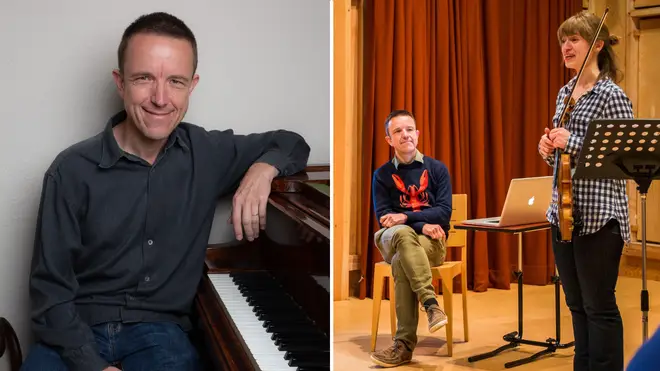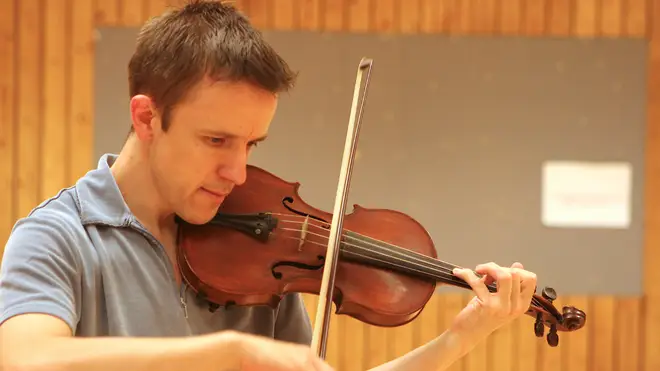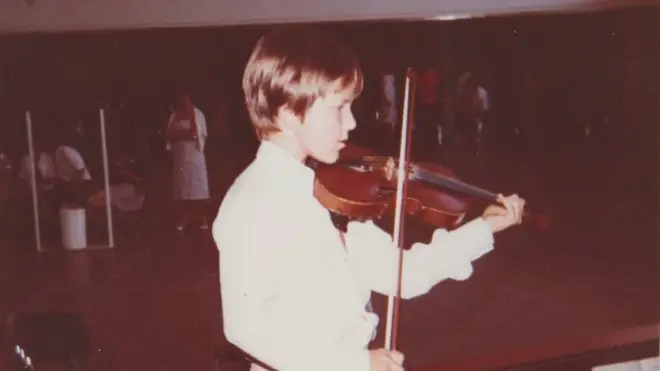On Air Now
Relaxing Evenings with Zeb Soanes 7pm - 10pm
29 June 2023, 16:26 | Updated: 29 June 2023, 18:20

We meet the award-winning composer whose diagnosis “forced me to confront what the most worthwhile thing for me to do right now is - and that’s writing music”.
Last year, Tony-nominated and Olivier-winning composer Adrian Sutton bravely announced to the world that he had been given a devastating incurable cancer diagnosis.
Sutton is a household name within the theatre community thanks in part to his memorable musical scorings for the National Theatre productions of War Horse, and The Curious Incident of the Dog in the Night-Time.
However, his recent diagnosis saw his head turn from his work in theatre to his first compositional love; writing for orchestra.
“I’ve always been an orchestral and chamber composer,” Sutton, 55, told Classic FM. “But that hasn’t been my focus because, of course, all these big theatre projects came along and they’ve been the centre of my attention for the past 20 years.
“But now, what this [diagnosis] has done is really force me to confront what the most worthwhile thing for me to do right now is. And that’s to write music. As dots on paper. To put it in front of people to play in a live setting.”
Read more: Cellist HAUSER plays ‘Phantom of the Opera’ on Lloyd Webber musical’s 35th anniversary

And a live setting is exactly how Sutton was able to premiere a selection of new music and newly orchestrated scores last night at the Southbank Centre in London.
Titled ‘Seize the Day: A Celebration of Adrian Sutton’, the award-winning composer produced a full concert of his music on the evening of 28 June 2023, nine months after he received the life-altering news.
Performed by the Royal Philharmonic Orchestra conducted by Michael Seal, and featuring the London Youth Choir, the concert featured two world premieres alongside a host of music which had previously been unorchestrated.
One of the premieres was a piece called ‘Short Story’, which Sutton admitted to Classic FM, “I sort of, pretty much, wrote and orchestrated the work entirely in the chemo suite.”
I don’t think I’ve ever been in a hall so full of love & joy.
— Fenella Humphreys (@fhvln) June 29, 2023
There just aren’t words.
Thank you @adriansutton for this beautiful night & your incredible notes.
Thank you @batonflipper & @royalphilorch for your stunning sound & making the best music together - you rock!
❤️❤️❤️ pic.twitter.com/bdHBJGHQsg
The second premiere was a 25 minute-long violin concerto, which Sutton only began writing following his diagnosis.
“I am a violinist myself,” Sutton reiterated when asked why a violin concerto was on his bucket list of compositions to write. “It is the most eloquent instrument, and it has a very strong voice of its own in the right hands.”
For Sutton, the right hands in question were those of British classical violinist, Fenella Humphreys, who premiered the concerto last night.
Writing on Twitter following the event, Humphreys said: “I don’t think I’ve ever been in a hall so full of love and joy. There just aren’t words.”
Lightly inspired by the novella by Richard Bach, Jonathan Livingston Seagull, Sutton’s concerto was originally envisaged as a partner concert piece for Ralph Vaughan Williams’ The Lark Ascending.
Jonathan Livingston Seagull is a story – aptly broken into three parts like a concerto, which references topics such as heaven, other lives, and an encouragement for readers to find peace within themselves through personal growth.
On the light inspiration drawn from the book, Sutton told Classic FM: “I’m not a religious person, but I think there’s this real humanity in that story.
“And sometimes, one can’t put these things into words. But I’m better at expressing those things in music, and I hoped that that captured some of the spirit of it.”
Read more: ‘It’s genius’ – classical music stars on why we love The Lark Ascending so much

War Horse (On Stage) Soundtrack - First Gallop
‘Seize the Day’ was hosted by Classic FM presenter Zeb Soanes. Ahead of the concert, Soanes stressed to Classic FM that Sutton’s concert was by no means a “swansong”, but rather a “tremendous celebration of one composer’s outstanding contribution”.
And the celebration of Sutton’s music is by no means over, as the composer is continuing to write, he is just a little more selective over what projects he takes.
“I'm writing music now for the sake of the music, rather than in service of something else,” Sutton explained.
And this is a message Sutton has echoed while visiting music schools and university departments in his quest to impart knowledge to the next generation of composers.
“The main piece of advice I give,” Sutton told Classic FM, “is that you only become an effective artist when you lose your fear of failure. Because failing is part of the job.
“You’re not going to find the real diamonds unless you do the mining.”
Read more: 80 percent of schoolchildren say more could be done to engage young people with orchestral music

“When you’re an artist and you’re creating stuff, you’ve got to come to terms with the fact that the early stages are about being messy and bad and not to be fearful of being judged by that.
“When I first started at the National Theatre, I walked into one of the most prestigious rehearsal rooms in the world, and there I was told, “We’re here to make mistakes. We need to find stuff out.
“And that was a really big revelation. And I’m trying to impress on young people that that is the path to take. By getting over your fear.”
In the wake of his diagnosis, Sutton has faced a whole new type of fear, but it seems only to have driven him to write the genre of music he has always wanted.
He told Classic FM that the next step was to “get done what you can do. And try and find some kind of meaning in what it is that you’re doing.”